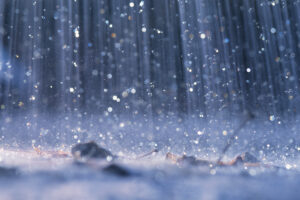
How much of a problem is it for rain to get into your swimming pool? It can actually end up being a big problem!
Rain showers can bring much-needed relief to parched landscapes and dusty surroundings, but for swimming pool owners, they can also bring a host of challenges. From water quality issues to structural concerns, rain can significantly affect the health and aesthetics of your pool. However, with proper mitigation and correction strategies in place, you can keep your pool in top condition even during the rainiest of seasons.
Effects of Rain on Swimming Pools
- Dilution of Chemicals: One of the most immediate effects of rain on a swimming pool is the dilution of chemicals. Rainwater, especially if it’s heavy, can quickly alter the chemical balance of your pool water, leading to imbalances in pH levels, alkalinity, and chlorine concentration.
- Contaminant Introduction: Rainwater isn’t pure; it carries various contaminants from the atmosphere and surrounding environment. Dust, pollen, leaves, and even bird droppings can find their way into your pool during a rain shower, increasing the pool’s overall contamination levels.
- Overflowing and Flooding: Excessive rainfall can cause swimming pools to overflow, leading to flooding in the surrounding area. This not only poses a safety hazard but can also damage pool equipment, decking, and nearby structures.
- Structural Damage: Over time, consistent exposure to rain can lead to structural issues in your pool, such as cracking, erosion of pool surfaces, and damage to the pool’s foundation. This can compromise the integrity of the pool and necessitate costly repairs.
Mitigation and Correction Strategies
- Cover Your Pool: Investing in a high-quality pool cover is one of the most effective ways to protect your pool from the effects of rain. A durable cover not only prevents rainwater from entering the pool but also helps maintain the chemical balance and temperature of the water.
- Monitor and Adjust Chemical Levels: Regularly test your pool water after rain showers and adjust the chemical levels accordingly. This may involve adding extra chlorine to combat contaminants introduced by rainwater or balancing pH and alkalinity levels to ensure water clarity and sanitation.
- Skim and Vacuum Debris: After a rainstorm, skim the surface of your pool to remove any debris that may have accumulated, such as leaves, twigs, and insects. Additionally, use a pool vacuum to clean the bottom of the pool and remove any sediment or dirt that may have settled.
- Ensure Proper Drainage: To prevent overflowing and flooding, ensure that your pool has proper drainage systems in place. Clear clogged drains and gutters regularly, and consider installing additional drainage channels or a sump pump to redirect excess water away from the pool area.
- Inspect for Structural Damage: After heavy rainfalls, inspect your pool for any signs of structural damage, such as cracks, leaks, or erosion. Address any issues promptly to prevent further deterioration and ensure the long-term integrity of your pool.
- Landscaping Considerations: Pay attention to the landscaping around your pool area, as it can affect water runoff and drainage. Proper grading and the strategic placement of plants, shrubs, and barriers can help minimize the impact of rainwater on your pool and surrounding structures.
- Regular Maintenance: Finally, maintain a consistent schedule of pool maintenance, including cleaning, filtration, and equipment inspection. By staying proactive and addressing any issues promptly, you can minimize the long-term effects of rain on your pool and enjoy crystal-clear water year-round.
Do You Have More Questions About Spas? Ask Sunrise Premiere Pool Builders LLC
If you still have questions about how to build a brand new swimming pool, Sunrise Premiere Pool Builders LLC is here to help you. At Sunrise Pools, we can build and install your pool, spa, or hot tub and provide you with pool chemicals, services, and more. If you have questions, feel free to give us a call at 410-349-3852. To see more from us and for tips and tricks, be sure to follow us on Facebook, Twitter, Pinterest, and LinkedIn.
